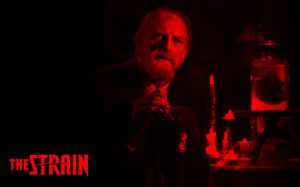 I finally had a chance to watch the first three episodes of The Strain after recording them. I am a big fan of Guillermo del Toro, including the material he produces. The television series is, of course, based on the 2009 novel by del Toro and Chuck Hogan. It incorporates some of the vampire conceptions that del Toro included in Blade II, and combines them with other facets of the long history of vampire lore.
I finally had a chance to watch the first three episodes of The Strain after recording them. I am a big fan of Guillermo del Toro, including the material he produces. The television series is, of course, based on the 2009 novel by del Toro and Chuck Hogan. It incorporates some of the vampire conceptions that del Toro included in Blade II, and combines them with other facets of the long history of vampire lore.
I noted while watching the series that it presents a secularized vampire that reproduces more like a contagion than as a supernatural entity, although it does retain the vestiges of the magical vampire of a previous generation. While the vampire has long been connected to disease, The Strain incorporates a disconnection of the supernatural from contagion. This shift from the supernatural to the natural vampire has been discussed previously in my interview with Titus Hjelm on “From Demonic to Genetic: The Rise and Fall of Religion in Vampire Film.”
This brings me to my second point, and that is how religion is featured in The Strain. It reflects both the skepticism of secularism, as well as that which comes from del Toro’s negative experiences with his grandmother’s Catholicism as a boy. One of the characters in The Strain is Abraham Setrakian, an Abraham Van Helsing-like character that connects present day conceptions of the vampire and their religious worldview with the present secular context. He has faced the rise of the vampires in the past, and is prepared to do so now, even if no one believes his ideas about the cause of the strange “infection.” In one scene, while Abraham is in jail for disturbing the peace, he is visited by Thomas Eichhorst, a vampire who serves The Master vampire that Abraham has battled before. With a plate of glass between them in the visitor’s area, Eichhorst taunts Setrakian and asks him where his God is, and why he isn’t intervening to stop this spread of The Master’s strain of vampirism.
Religion is also featured in the series through two other characters. Ephraim Goodweather is a recovering alcoholic, and he attends a support group meeting at a church. Guadalupe Elizade is a mother with two grown and criminally troubled sons, who is depicted as a faithful Roman Catholic. In the depictions of religion through these characters the picture is one of impotence, or at least unimportance to the serious challenges of life. Goodweather attends the support group meetings only out of necessity in an attempt to gain joint custody of his son, but there is no evidence he finds any spiritual value in it. Elizade is a woman who attends church regularly, but it is of no interest to her sons, and it presents little value to anyone other than the elderly who may attend more out of tradition than anything else.
I haven’t read the book so I don’t know if religion will surface again in the series, or if it does whether it will play a slightly more positive role in Abraham Setrakian’s character given his connection to a vampiric worldview from the past. At any rate, it will be fun to watch as ever-changing monstrous concepts in connection with religion are played out on the small screen.





2 Responses to “Contagious Vampires and Impotent Religion in “The Strain””